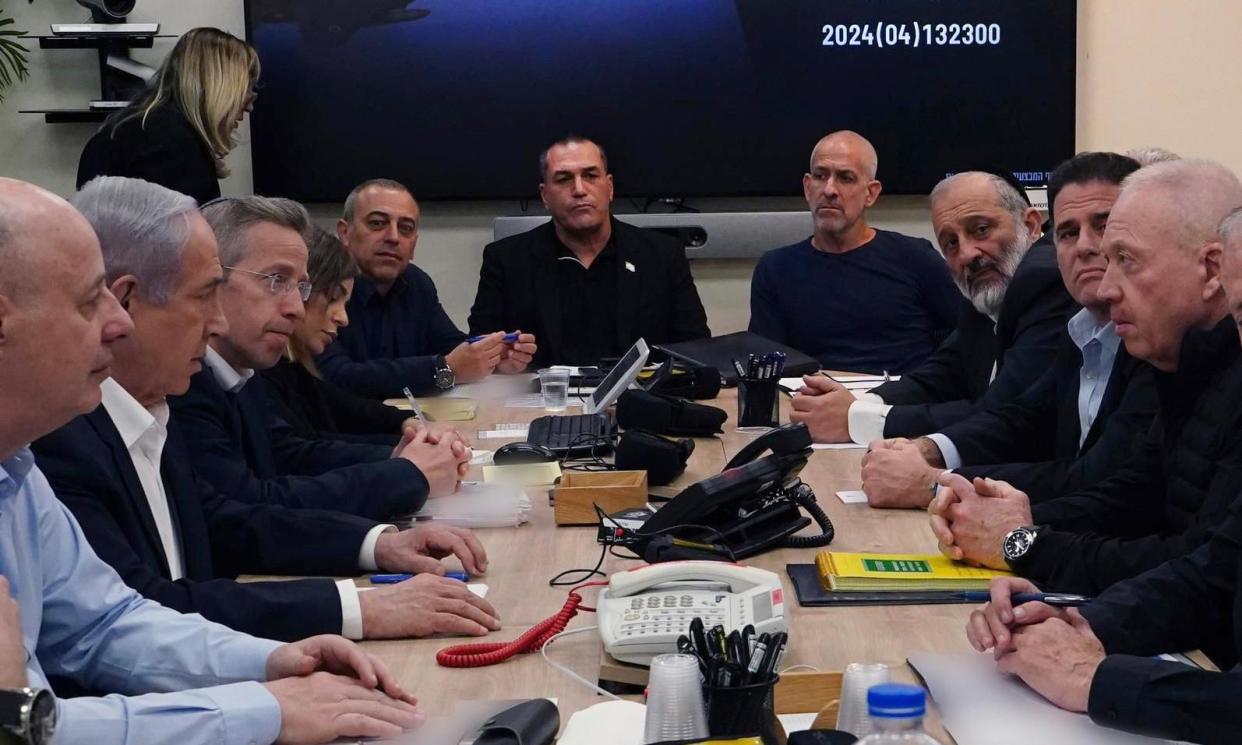Iran missile and drone attack on Israel – what we know so far

Iran launched hundreds of drones as well as cruise missiles towards Israel, in the Islamic Republic’s first ever direct attack on the Jewish state, in response to the 1 April strike on an Iranian diplomatic building in the Syrian capital, Damascus, which killed a senior figure in Iran’s Islamic Revolutionary Guards and eight other officers.
Benny Gantz, a member of the war cabinet, said that Israel will exact a price from Iran in response to its mass missile and drone attack when the time is right. His comments came ahead of a war cabinet meeting alongside Israel’s prime minister, Benjamin Netanyahu, and the country’s defence minister, Yoav Gallant.
Tehran has warned it will strike again with greater force if Israel or the US retaliate for the Iranian strike on Israel by more 300 drones and missiles on Saturday night. The air raids, the Islamic Republic’s first ever direct attack on the Israeli state, brought a years-long shadow war into the open and threatened to draw the region into a broader conflagration as Israel said it was considering its response.
However, the attack, mostly launched from inside Iran, caused only modest damage in Israel as most were shot down with the help of the US, Britain and Jordan. An air force base in southern Israel was hit, but continued to operate as normal and a seven-year-old child was seriously hurt by shrapnel. There were no other reports of serious damage. Israeli military spokesperson Rear Adm Daniel Hagari said that 99% of the launches had been intercepted.
Most of the Iranian drones flying over Syria’s airspace during Tehran’s strikes overnight were downed by Israeli and US jets before reaching their targets in Israel, two western intelligence sources told Reuters.
The UN security council will hold an emergency meeting on Sunday at the request of Israel’s ambassador to the UN, the council’s president said in a statement.
Iran informed Turkey in advance of its planned operation against Israel, a Turkish diplomatic source has told Reuters. The source also said that the US conveyed to Iran via Ankara that its operation must be “within certain limits”. These reports come after Iran’s foreign minister, Hossein Amirabdollahian, said in a meeting with foreign ambassadors in Tehran that Iran had informed the US that its attacks against Israel will be “limited” and for self-defence only.
John Kirby, the White House’s top national security spokesperson, told ABC’s This Week programme on Sunday that the US will continue to help Israel defend itself, but does not want war with Iran. “We don’t seek escalated tensions in the region. We don’t seek a wider conflict,” Kirby said. News outlet Axios reported that Joe Biden, the US president, had told Netanyahu that he would oppose an Israeli counterattack against Iran and that the prime minister should “take the win”.
UK Royal Air Force fighter jets and refuelling aircraft were also involved in Israel’s defence, taking off from bases in Cyprus. Their role, according to the UK Ministry of Defence, was to fill in for the US air force in the sorties against Islamic State normally carried out over Iraq and north-eastern Syria, but also to intercept Iranian drones if they came into the UK area of operations.
World leaders have condemned Iran’s attack, with regional powers including Saudi Arabia and Egypt calling for restraint. The UN secretary general, António Guterres, said: “I am deeply alarmed about the very real danger of a devastating region-wide escalation. I urge all parties to exercise maximum restraint to avoid any action that could lead to major military confrontations on multiple fronts in the Middle East.”
Jordan’s prime minister, Bisher Khasawneh, warned that any escalation in the region would lead to “dangerous paths”, joining a chorus of condemnation from world leaders to the attack. Other countries including the UK, Spain, the US, Egypt, Saudi Arabia and China, have called for restraint amid fears of a regional escalation of conflict across the Middle East. Iran’s foreign ministry has summoned the ambassadors of the UK, France, and Germany to question what it referred to as their “irresponsible stance” regarding Tehran’s retaliatory strikes on Israel, the semi-official Iranian Labour news agency reported.
Major airlines across the Middle East, including Emirates Airlines and Qatar Airways, announced they would resume some of their operations in the region after cancelling or rerouting some flights in response to Iran’s attack on Israel. Israel said it had reopened its airspace as of 7:30am local time on Sunday morning, with Beirut airport also reopening this morning. Several Iranian airports, including Tehran’s Imam Khomeini International, however, have cancelled flights until Monday.

 Yahoo News
Yahoo News 
